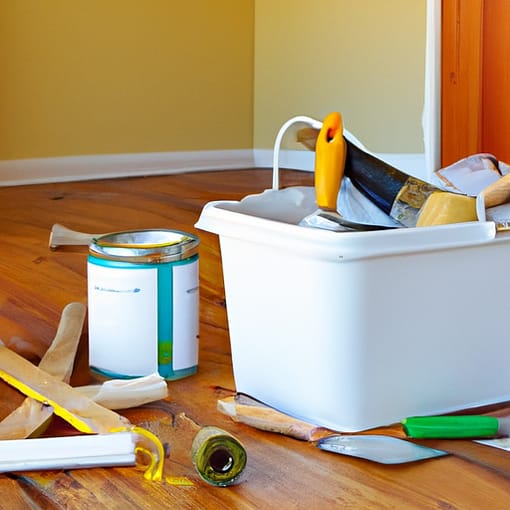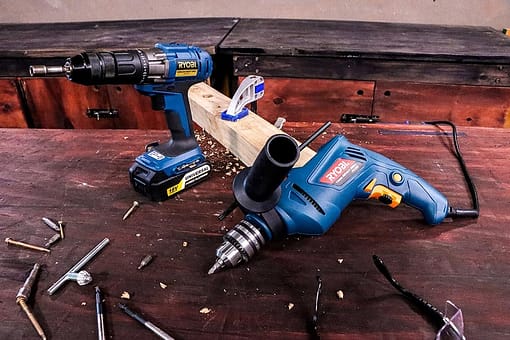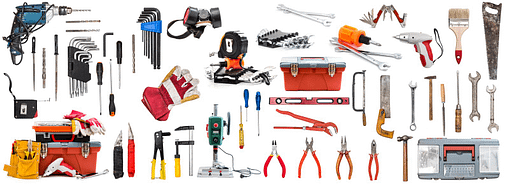Are you tired of looking at your unfinished projects? Want to become a DIY master but not sure where to start? Look no further than “How Do I Improve My DIY Skills?” This comprehensive guide is packed with practical tips and expert advice to help you sharpen your DIY skills and tackle any project with confidence. Whether you’re a novice or an experienced DIY enthusiast, this product is your ultimate resource for unlocking your true DIY potential. Get ready to unleash your creativity and bring your DIY dreams to life!
Gain Knowledge
Start with Basic DIY Skills
To improve your DIY skills, it’s essential to start with the basics. Familiarize yourself with fundamental concepts and techniques such as measuring, cutting, and drilling. These skills form the foundation of all DIY projects. By understanding the basics, you’ll have the necessary knowledge to move on to more complex tasks.
Research Different DIY Techniques
Expand your DIY knowledge by researching various techniques. There are numerous resources available online, including articles, videos, and tutorials. Take the time to explore different methods and approaches used by experts in the field. This research will help you understand the best practices and identify the techniques that suit your style and preferences.
Learn from DIY Books and Magazines
To gain a comprehensive understanding of DIY, consider investing in educational materials such as books and magazines. These resources often cover a wide range of topics from basic skills to advanced techniques. They provide detailed step-by-step instructions, illustrations, and useful tips. Reading DIY publications allows you to learn at your own pace and refer back to information whenever necessary.
Take DIY Courses or Workshops
Taking DIY courses or workshops can be immensely beneficial in improving your skills. Look for local community centers, vocational schools, or online platforms that offer these types of programs. Instructors with expertise in various DIY areas can guide you through hands-on projects and provide valuable feedback. Utilizing these educational opportunities will help you gain a deeper understanding of DIY techniques and build your confidence.
Practice Regularly
Start with Small Projects
A great way to improve your DIY skills is to start with small projects. These projects not only build your abilities but also reinforce your confidence. Begin by tackling simple tasks such as painting a room or assembling furniture. As you complete these projects successfully, you’ll gain experience and become more comfortable working with tools and materials.
Choose Projects Based on Your Interests
To stay motivated and engaged, choose DIY projects that align with your interests. Whether it’s woodworking, home decor, or electronics, focusing on projects that you find exciting and enjoyable will spark creativity and passion. When you’re enthusiastic about a project, you’ll be more willing to invest the time and effort required to hone your skills.
Set Realistic Goals
Setting realistic goals is crucial when it comes to DIY improvement. Break down your projects into manageable steps and establish achievable milestones. This approach allows you to track your progress and celebrate your accomplishments along the way. By setting realistic goals, you’ll avoid unnecessary frustration and gain a sense of satisfaction as you complete each milestone.
Allocate Time for DIY Projects
Consistency is key when it comes to improving your DIY skills. Set aside dedicated time each week or month to work on your projects. Treating DIY as a regular activity, rather than a sporadic hobby, allows you to progress steadily. Schedule your DIY time in advance and commit to it, just as you would with any other important appointment.
Document Your Progress
Keeping a record of your DIY journey is a valuable tool for improvement. Document your projects by taking photos, writing descriptions, or creating a DIY journal or blog. Not only does this documentation serve as a reference for future projects, but it also allows you to reflect on your progress and recognize areas for improvement. Sharing your experiences with others can also inspire and motivate fellow DIY enthusiasts.

Build a DIY Toolkit
Basic Hand Tools
To enhance your DIY skills, it’s essential to have a well-stocked toolbox. Start with basic hand tools such as a hammer, screwdriver set, pliers, and wrenches. These tools will be the backbone of your DIY endeavors, enabling you to handle a wide range of tasks with ease.
Power Tools
While hand tools are essential, power tools can significantly enhance your efficiency and capability. Invest in a quality drill, circular saw, jigsaw, and power sander, among others. These power tools can handle more advanced projects and allow you to work with various materials effectively.
Measuring and Marking Tools
Accurate measurements are vital for successful DIY projects. Equip yourself with measuring tools such as a tape measure, combination square, and level. Additionally, marking tools like a pencil, chalk line, and utility knife will help you precisely outline your cuts and installations.
Safety Equipment
Safety should be a top priority in any DIY endeavor. Prioritize your well-being by investing in safety equipment such as goggles, gloves, and ear protection. For projects that involve working with loud machinery or hazardous materials, consider adding a dust mask, respirator, or safety goggles with a face shield to your toolkit.
Miscellaneous Tools and Supplies
In addition to the core tools mentioned above, there are a variety of miscellaneous items that can prove useful in DIY projects. These may include a toolbox, tool belt, flashlight, extension cord, hardware assortment, adhesive tapes, and various fasteners such as screws, nails, and bolts. Keep these items stocked to ensure you’re always prepared for any DIY task.
Master Essential DIY Techniques
Cutting Techniques
Learning various cutting techniques is essential for almost every DIY project. Understand different saw types, such as circular, jigsaw, and handsaws, and practice making accurate, straight, and angled cuts. Mastering cutting techniques will enable you to work with different materials, such as wood, plastic, and metal, effectively.
Joinery Techniques
Joinery refers to the methods used to connect two or more pieces of material, creating strong and durable structures. Some common joinery techniques include butt joints, dovetail joints, and mortise and tenon joints. Experiment with these techniques to improve your ability to create sturdy connections in your DIY projects.
Painting and Finishing Techniques
Painting and finishing can elevate the aesthetic appeal of your DIY creations. Brush up on painting techniques such as preparing surfaces, applying primer, and using different types of brushes or rollers. Additionally, learn about finishing techniques like staining, varnishing, or applying sealants to protect and enhance the appearance of your projects.
Electrical and Wiring Techniques
Understanding basic electrical and wiring techniques is highly valuable in DIY projects involving lighting fixtures, outlets, or switches. Learn how to safely strip wires, make connections, and troubleshoot common electrical issues. Always prioritize safety and consult a professional if you’re unsure about any electrical work.
Plumbing Techniques
Plumbing skills are necessary for projects involving pipes, faucets, or toilets. Familiarize yourself with different pipe materials, joining methods, and basics of water flow. Additionally, learn how to repair common plumbing problems such as leaks or clogs. Developing these skills will empower you to handle minor plumbing tasks without relying on expensive professionals.
Masonry Techniques
If you’re interested in outdoor and landscaping projects, mastering masonry techniques will be invaluable. Learn how to lay bricks or pavers, mix and apply mortar, and create solid foundations. With the right knowledge and skills, you can create beautiful and functional structures such as patios, garden walls, or pathways.

Learn from Experienced DIYers
Join DIY Communities or Forums
Joining DIY communities or online forums offers an excellent opportunity to connect with fellow DIY enthusiasts. By engaging in discussions and sharing ideas, you’ll gain insights from experienced individuals who can offer guidance and answer your questions. Joining such communities will expand your knowledge, foster creativity, and provide a support network of like-minded individuals.
Attend DIY Workshops or Meetups
Attending DIY workshops or local meetups allows you to learn directly from experienced DIYers. These events often offer hands-on activities, demonstrations, and the chance to network with experts. Workshops catered to different DIY areas, such as woodworking, electronics, or home improvement, can provide valuable knowledge and practical tips from skilled professionals.
Connect with DIY Experts
Taking the initiative to connect with DIY experts can provide unparalleled learning opportunities. Reach out to professionals in your community or through social media platforms to seek advice or mentorship. With their guidance, you’ll gain valuable insights, receive personalized feedback, and develop a deeper understanding of advanced DIY techniques.
Participate in DIY Challenges or Competitions
Participating in DIY challenges or competitions is an excellent way to push your boundaries and refine your skills. These events often include specific project requirements or themes, allowing you to explore new techniques and materials. Engaging in friendly competition with other DIYers can fuel your motivation and inspire you to improve your abilities.
Seek Inspiration
Browse DIY Websites and Blogs
Exploring DIY websites and blogs is a fantastic way to gather inspiration for your projects. Numerous websites feature step-by-step tutorials, project ideas, and inspirational photos. Browse through these platforms to discover new and innovative DIY concepts, as well as tips and tricks shared by experienced DIYers.
Watch DIY Videos and Tutorials
Video tutorials have become increasingly popular in the DIY realm, offering visual guidance and demonstrations. Platforms such as YouTube provide a vast library of DIY videos covering a wide range of topics. Utilize these resources to watch experts in action and learn from their techniques. Additionally, subscribing to DIY-focused channels allows you to stay updated on the latest trends and ideas.
Follow DIY Influencers on Social Media
Social media platforms are teeming with DIY influencers who share their projects, tips, and advice. Follow popular DIY accounts on platforms like Instagram, Pinterest, or Facebook for a constant stream of creative ideas. These influencers often provide valuable insights and can serve as a source of inspiration for your future projects.
Visit Home Improvement Stores or Exhibitions
Visiting home improvement stores or attending exhibitions allows you to see the latest products, materials, and innovative solutions in person. These spaces often display DIY projects, offer demonstrations, and provide expert advice. Exploring these venues can spark ideas and help you envision new possibilities for your own DIY endeavors.
Challenge Yourself
Tackle Advanced DIY Projects
Once you’ve built a solid foundation of skills and knowledge, challenge yourself with more advanced DIY projects. Push your boundaries by attempting complex tasks that require problem-solving skills and a deeper understanding of techniques. Embracing these challenges will not only test your abilities but also provide significant opportunities for growth.
Experiment with Different Materials
Diversify your DIY experience by experimenting with different materials. While wood is a common material in many projects, consider working with metal, glass, or fabric. Each material presents unique challenges and requires specific techniques. By exploring various materials, you’ll expand your skill set and develop versatility in your DIY abilities.
Try Out-of-the-Box Ideas
To truly improve your DIY skills, don’t be afraid to think outside the box. Break away from traditional project ideas and explore unconventional concepts. Engage in upcycling, repurposing, or creating original designs. Embracing innovation and experimenting with new ideas will sharpen your problem-solving abilities and fuel your passion for DIY.
Learn New DIY Skills
Continuous learning is crucial in any pursuit, including DIY. Challenge yourself to learn new skills regularly, even if they aren’t directly related to your current projects. This expansion of knowledge will foster creativity, broaden your expertise, and open doors to exciting projects you may not have considered before.
Learn to Troubleshoot
Identify Common DIY Problems
Every DIY project presents its own set of challenges and potential problems. It’s crucial to identify common issues that may arise during different stages of a project. Recognizing these problems early on allows you to proactively find solutions and prevent them from escalating into larger obstacles.
Research Solutions
When faced with a DIY problem, conduct thorough research to find potential solutions. Online resources, books, forums, and expert advice can all offer guidance. Take the time to explore different approaches and strategies employed by experienced DIYers to overcome similar challenges. This systematic approach to problem-solving will enhance your ability to troubleshoot effectively.
Apply Problem-Solving Techniques
Developing problem-solving techniques is a valuable skill in DIY. Break down complex problems into smaller, manageable parts, and analyze each component individually. This process helps you identify the root causes and devises targeted solutions. Utilize critical thinking, creativity, and resourcefulness to overcome obstacles and achieve your desired outcomes.
Ask for Help When Needed
Remember that DIY doesn’t mean doing everything entirely on your own. Don’t hesitate to seek help when faced with a problem that surpasses your expertise. It could be consulting experienced individuals, reaching out to fellow DIY enthusiasts, or hiring professionals for specific tasks. Asking for help is a sign of wisdom and ensures the best possible outcome for your project.
Document and Review
Maintain a DIY Journal or Blog
Maintaining a DIY journal or blog is an excellent way to document your projects and review your progress. This written record provides a valuable reference for future projects and allows you to reflect on your growth and experiences. Share your thoughts, challenges, and successes, and inspire others who come across your journal or blog.
Take Pictures of Your Projects
Photographs are a powerful visual tool to document your DIY journey. Capture images of your projects at different stages, from start to completion. These pictures not only provide a sense of accomplishment but also serve as an excellent reference for future projects or when seeking feedback and advice.
Evaluate Your Work
Regularly evaluate your completed projects to identify areas for improvement. Assess the quality of your workmanship, attention to detail, and overall aesthetics. Consider what worked well and what could have been done differently. Embracing a critical eye will help you grow as a DIYer and refine your skills.
Identify Areas for Improvement
Identifying areas for improvement is essential for continuous growth in DIY. Be honest with yourself and assess your weaknesses and areas that require additional attention. This self-reflection allows you to prioritize your learning, seek resources and education in specific areas, and target your efforts towards further improvement.
Stay Safe
Educate Yourself on Safety Precautions
Safety is paramount when engaging in DIY projects. Educate yourself on the proper safety precautions associated with specific tools, materials, and techniques. Learn about potential hazards, such as electrical shocks, injuries from power tools, or exposure to harmful chemicals. Prioritize safety by understanding how to mitigate risks and protect yourself during every DIY endeavor.
Use Protective Gear
Always utilize appropriate protective gear to reduce the risk of injury. Wear safety glasses or goggles to safeguard your eyes from debris or potential splashes. Gloves provide hand protection, and ear protection guards against excessive noise. When handling potentially hazardous substances or working with power tools, respiratory masks or respirators should also be employed.
Follow Instructions and Guidelines
To ensure safety and achieve optimal results, adhere to the manufacturer’s instructions and guidelines for tools, materials, and products. Each item may have specific recommendations or precautions. Following these instructions diligently enhances your safety and helps you achieve the best possible outcome in your DIY projects.
Know Your Limits
Understanding your limits is essential for maintaining safety during your DIY projects. Recognize when a task exceeds your skill level or expertise and be willing to seek professional assistance. Taking on projects beyond your abilities can lead to accidents or subpar outcomes. It’s better to acknowledge your limitations and learn from professionals or experienced DIYers.
First Aid for DIY Accidents
Even with the utmost caution, accidents can happen during DIY projects. Familiarize yourself with basic first aid techniques to address minor injuries and mitigate potential harm. Keep a well-stocked first aid kit easily accessible in your workspace. Knowing how to respond to common DIY accidents will ensure prompt treatment and a safer DIY environment.
By following these comprehensive steps, you’ll be well on your way to improving your DIY skills. Remember, practice and persistence are key. Embrace the learning process, seek inspiration, and stay curious. With each DIY project, you’ll gain valuable experience and confidence in your abilities. Happy DIYing!













